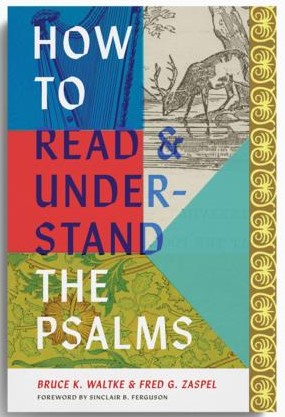
Bruce Waltke and Fred Zaspel
Reviewed by: Bryan D. Estelle
How to Read and Understand the Psalms, by Bruce Waltke and Fred Zaspel. Crossway, 2023. Hardcover, 608 pages, $49.99. Reviewed by Professor Bryan D. Estelle.
Waltke and Zaspel have written a brilliant, Christ-centered, and easily accessible introduction to the Psalter. Although they acknowledge that the Psalms speak of Christ, they recognize that they do so in various ways. The book will appeal to the pastor preparing to preach as well as the layperson desiring to know more about how to read the Psalms well.
The authors begin by setting the correct hermeneutical posture when approaching God’s Word. The same appreciation for a precritical (pre-enlightenment) stance that pervaded Waltke’s previous work on the Psalter is noticeable here. Intellectual humility on the part of the interpreter and a high view of the inspiration of the Scriptures by God are commended.
Next, they address the importance of the historical titles in the Psalter (of which there are fourteen) and whether the psalms attributed to David represent his authorship. This should have included a more nuanced discussion of the meaning of the preposition attached to David’s name. The rejection of David’s authorship in some of the psalms is not merely due to a hyper-critical posture toward the Bible initiated by the German scholar Julius Wellhausen (1844–1918), although a reader of this book may gain that impression.
In attempting to engage these problems, it is necessary to examine first the potential meaning of the Hebrew preposition ‘lamed’ which is prefixed to the persons named in the titles. There are several possibilities for translating this: e.g., “for” David; “by” David, i.e., belonging to David as author; “to” David, i.e., perhaps in the sense of “dedicated to . . .”, “with reference to, concerning, about,”; and finally, “for the use of David.” In short, each psalm should be handled on a case-by-case basis.
This reviewer also thinks that E. J. Young, in his Introduction to the Old Testament, has captured the right posture toward the titles. He states, “In defending [he says] the essential trustworthiness of the titles, I do not mean to suggest that as they stand they are above investigation or criticism. But a cautious and reverent criticism, it seems to me will be unable to dismiss them in their entirety as valueless witnesses of authorship.”
Having covered these and other preliminary issues, the authors compare the various kinds of psalms represented in the Psalter in chapters 8–13: Praise Psalms, Laments, Individual Songs of Grateful Praise (i.e., Thanksgiving), Songs of Trust (refuge), Messianic Psalms, and finally Didactic Psalms. The last two chapters discuss rhetorical criticism and the final arrangement of the Psalter. Finally, there are two appendixes attached that were originally published elsewhere.
In the chapter on Lament Psalms (chapter 9), the authors take up the issue of imprecatory psalms, those places in the Psalms that have been puzzling to Christians where we have “prayers that God will avenge the psalmist for the wrong being done by an enemy by justly punishing the violator” (306). The authors handle the subject relatively well and even mention that there is “an eschatological aspect to these psalms that we should not miss” (309). However, strangely missing from the discussion is another commendable approach that helps us understand the role of imprecations in the Psalms based on M. G. Kline’s concept of “intrusion ethics.” Kline, building on the eschatological concepts developed by Geerhardus Vos, helps us understand the intrusion (heaven, and the future “breaking in” on the earthly realm) of God’s actions, especially in reference to the common grace order. (For more on this, see my article “Why Christians Sing the Psalms,” at the website trinitypsalterhymnal.org.)
This book is a real treasure trove for the preacher or Sunday school teacher since the authors give many outlines of different psalms, especially some of the “favorites,” or most memorable.
April 14, 2024
How to Read and Understand the Psalms
April 07, 2024
March 31, 2024
My Grandmother Is Praying for Me
March 24, 2024
March 17, 2024
Safeguards: Shielding Our Homes and Equipping Our Kids
March 10, 2024
Ten Words from God: An Exposition of the Ten Commandments
March 03, 2024
Reactivity: How the Gospel Transforms Our Actions and Reactions
© 2024 The Orthodox Presbyterian Church